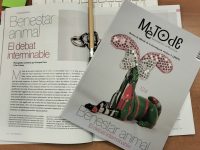Knowledge without conscience is but the ruin of the soul», François Rabelais wrote. With this famous sentence, the French writer warned about the danger of letting ourselves be carried away by excessively scientistic thinking. Goya also wrote: «The sleep of reason produces monsters», insisting on the risk of a stark vision of reality exclusively dictated by reason that removed any room for feeling. Certainly, the history of science has been sieged by superstition and dogmatism, and progress was achieved by overcoming an infinite obstacle course, with some paradigmatic cases, such as Galileo’s or Charles Darwin’s. But also, in some instances, scientific thinking has reached high levels of dogmatism and dehumanisation that have led to dark episodes, such as eugenics or the military use of nuclear energy. In this monograph, we walk around this jungle with the intention to reflect on the obstacles created when science and ideology clash. In this sense, Michael Ruse and Janet Browne focus their study on Darwinism and its social application; Philip Ball, on the use of physics by Nazi Germany; Xavier Roqué, on the relationship between science and Franco’s regime, and Jesús I. Català and Juli Peretó analyse quite an unknown conflict between science and religion. Ultimately, we present several «interferences» between scientific knowledge and its historical context, and the consequence of such clashes for the advancement of science.





